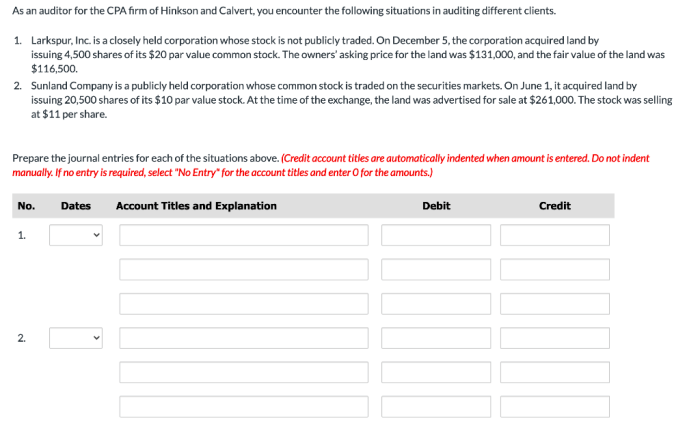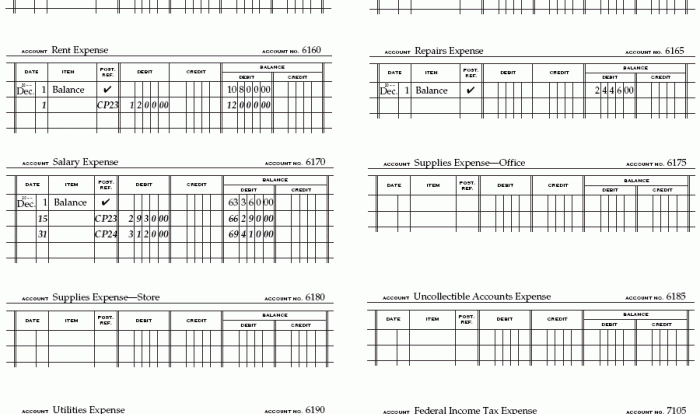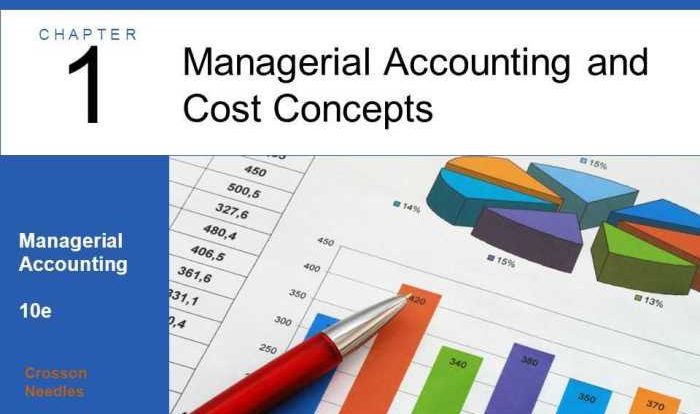As an auditor for the cpa firm of hinkson – Delving into the realm of accounting and auditing, we embark on a journey to explore the multifaceted role of an auditor for the esteemed CPA firm of Hinkson. This comprehensive guide will illuminate the intricacies of this profession, highlighting its significance, responsibilities, and the standards that guide the work of these financial sentinels.
As an auditor for Hinkson CPA Firm, one assumes a position of immense responsibility, entrusted with the task of ensuring the accuracy and integrity of financial information. The auditor’s unwavering commitment to independence and objectivity serves as the cornerstone of their work, ensuring that their findings remain impartial and free from bias.
1. Auditor’s Role within Hinkson CPA Firm
Within Hinkson CPA Firm, auditors play a crucial role in ensuring the accuracy and reliability of financial information. Their primary responsibilities include:
- Examining financial records and supporting documentation to verify the accuracy and completeness of financial statements.
- Assessing the effectiveness of internal controls to identify any weaknesses or deficiencies.
- Performing analytical procedures to identify potential areas of concern or fraud.
- Communicating audit findings and recommendations to management and other stakeholders.
Independence and objectivity are paramount in the auditing process. Auditors must maintain a neutral stance, free from any conflicts of interest, to ensure that their opinions are unbiased and reliable.
Specific Tasks and Procedures Performed by Auditors
Auditors at Hinkson CPA Firm perform a wide range of tasks and procedures, including:
- Reviewing financial statements and supporting schedules.
- Performing analytical procedures to identify trends and anomalies.
- Testing internal controls over financial reporting.
- Interviewing management and other employees.
- Examining physical assets and observing inventory counts.
- Evaluating the adequacy of disclosures in financial statements.
2. Auditing Standards and Procedures

Auditors at Hinkson CPA Firm adhere to a strict set of auditing standards and regulations, including:
- International Standards on Auditing (ISAs)
- Generally Accepted Auditing Standards (GAAS)
- Public Company Accounting Oversight Board (PCAOB) standards
These standards provide a framework for conducting audits and ensure that they are performed consistently and effectively.
Key Steps Involved in an Audit Engagement
An audit engagement typically involves the following key steps:
- Planning
- Risk assessment
- Internal control testing
- Substantive testing
- Reporting
Methods Used to Gather and Evaluate Audit Evidence
Auditors gather audit evidence through a variety of methods, including:
- Inspection of documents
- Observation of processes
- Inquiries of management and other employees
- Analytical procedures
- Confirmation of balances with third parties
3. Financial Statement Analysis
Auditors use various techniques to analyze financial statements and identify potential areas of concern. These techniques include:
- Horizontal analysis (trend analysis)
- Vertical analysis (common-size analysis)
- Ratio analysis
- Cash flow analysis
By performing these analyses, auditors can identify unusual trends, fluctuations, or inconsistencies that may warrant further investigation.
Common Financial Statement Anomalies
Some common financial statement anomalies that may indicate potential fraud or misstatement include:
- Unexplained increases or decreases in account balances
- Inconsistent relationships between financial statement items
- Unusual ratios or trends
- Lack of supporting documentation
Role of Analytical Procedures in the Audit Process, As an auditor for the cpa firm of hinkson
Analytical procedures are an essential part of the audit process. They help auditors identify potential areas of concern by comparing financial data to expected results or industry benchmarks. These procedures can also help identify unusual trends or relationships that may indicate fraud or misstatement.
4. Internal Control Evaluation
Internal control evaluation is a critical aspect of the audit process. Auditors assess the effectiveness of internal controls to identify any weaknesses or deficiencies that could increase the risk of fraud or misstatement.
Methods Used to Assess the Effectiveness of Internal Controls
Auditors use various methods to assess the effectiveness of internal controls, including:
- Reviewing internal control documentation
- Observing internal control activities
- Testing internal controls
- Interviewing management and other employees
Implications of Weak Internal Controls on the Audit Process
Weak internal controls can significantly impact the audit process. Auditors may need to perform additional testing or procedures to compensate for the weaknesses, which can increase the time and cost of the audit.
5. Reporting and Communication

Auditors at Hinkson CPA Firm issue various types of audit reports, including:
- Unqualified opinions
- Qualified opinions
- Adverse opinions
- Disclaimers of opinion
The type of opinion issued depends on the auditor’s assessment of the financial statements and the effectiveness of internal controls.
Auditor’s Responsibility to Communicate Audit Findings and Recommendations
Auditors have a responsibility to communicate their audit findings and recommendations to management and other stakeholders. This communication may include:
- Management letters
- Financial statement footnotes
- Auditor’s reports
Effective Communication Strategies for Auditors
Effective communication strategies for auditors include:
- Using clear and concise language
- Tailoring communication to the audience
- Providing supporting evidence for findings and recommendations
6. Continuing Professional Development: As An Auditor For The Cpa Firm Of Hinkson

Continuing professional development (CPD) is essential for auditors at Hinkson CPA Firm. Auditors must stay up-to-date on accounting and auditing standards, as well as emerging trends and technologies.
Ongoing Education and Training Requirements
Auditors at Hinkson CPA Firm are required to complete a minimum number of CPD hours each year. These hours may be earned through:
- Attending conferences and seminars
- Taking online courses
- Reading professional journals and articles
Importance of Staying Up-to-Date on Accounting and Auditing Standards
Staying up-to-date on accounting and auditing standards is critical for auditors to ensure that their work is performed in accordance with the latest requirements. Auditors who fail to stay current may risk issuing inaccurate or misleading opinions.
Benefits of Professional Development for Auditors
Professional development benefits auditors by:
- Expanding their knowledge and skills
- Improving their job performance
- Advancing their careers
Common Queries
What are the primary responsibilities of an auditor for Hinkson CPA Firm?
Auditors at Hinkson CPA Firm are responsible for conducting financial audits, evaluating internal controls, analyzing financial statements, and reporting their findings and recommendations to management and stakeholders.
What are the key auditing standards that guide the work of auditors at Hinkson CPA Firm?
Auditors at Hinkson CPA Firm adhere to the International Standards on Auditing (ISA) and the Generally Accepted Auditing Standards (GAAS), which provide a framework for conducting audits and ensuring the quality of audit work.
What are some common financial statement anomalies that may warrant further investigation by auditors?
Common financial statement anomalies that may raise red flags for auditors include unusual fluctuations in key financial ratios, unexplained changes in accounting policies, and inconsistencies between financial statements and other sources of information.

